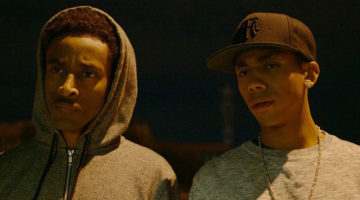Review: Fury
“Ideals are peaceful. History is violent”. So says Brad Pitt, as “Wardaddy”, (though essentially playing Brad Pitt, or at least a version of his character from Inglourious Basterds), the Staff Sergeant, to Norman “Cobb”, embodied by Logan Lerman, the rookie, who feels shell-shocked and unprepared by the horrors found in the theatre of war.
Whether or not an audience member will enjoy Fury essentially comes down to that statement. Fury is very much steeped in history, as it is not only extremely violent, but quite gory as well. However, writer-director David Ayer perhaps puts this quote in the mouth of the seen-it-all Wardaddy to show that Norman must look to the ground, towards situational ethics, and that this is the new ‘Norm’, rather than to the high-mindedness to which he is used.
And in essence, Fury is about Norm almost-but-not-quite becoming Wardaddy and starting to become aware that high-minded, peaceful ideals are not going to make it in Germany in 1945. The transformation that Norm undergoes is the core of the movie, realizing that he must be violent when the situation calls for it, (he is a tanker, after all). This potential subtext instead weighs quite heavily, perhaps no more than when Norm is cleaning up his station and comes across a human face. From where did the face come? To whom did it belong? The movie never reveals, but Ayer seems to be beckoning, almost daring his audience to give into Norms, and accept that war, and history, truly is violent.
Fury sees an extended scene in the middle of Fury that sees Norm and Wardaddy playing a bizarro game of house, taking over a German home and cohabiting with the two women inside, (luckily, Wardaddy speaks fluent German). It is here that the movie takes on a sense of levity, of a kind of peaceful ideals, which is eventually loudly interrupted by their squadron, (Michael Peña, The Wolf of Wall Street’s Jon Bernthal, and Shia LaBeouf), and the principals are forced to readapt to the violence and unfortunate non-idealism of war.
Indeed, many of the scenes take place in the period-correct war machines, perhaps a first in mainstream film, (the movie could have been called Tank Boys) are indeed filled with Fury. There is both in terms of the unmitigated anger that the men feel towards German, and indeed, the need for Ayer to want to prove his violent thesis over and over again, (at least until the end of the movie, when he seems to undo his key point, perhaps ironically).
Spending over two hours with these mostly awful characters, (surprisingly, LaBeouf is perfectly fine, although seeing him draped over his squadmates and missing a tooth seem bizarre) becomes rather fury-inducing on the audience’s part, (or at least the audience that has not given over to the violent premise of the film). So while “history” may be violent, certain members of the audience may quickly be inclined to “peace” out.
[star v=25]



